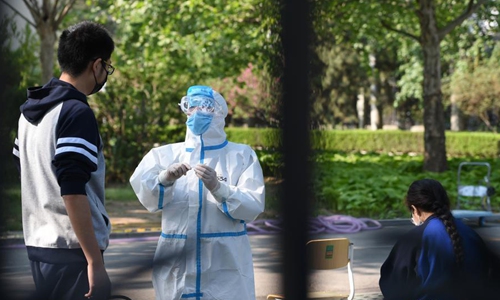Beijing builds regular COVID-19 monitoring system amid concerns of disease rebound in winter
By Wang Qi Source:Global Times Published: 2020/6/11 16:15:47

A student has his temperature taken at entrance of a high school in Beijing, April 27, 2020. (Photo: China News Service/ Hou Yu)
Beijing is building a regular COVID-19 monitoring system amid other measures to improve its public health system to prepare for a possible rebound of the disease in autumn and winter.
In a guideline released on Thursday, the Beijing Health Commission urged hospitals, institutions and health regulators at district level to actively prepare for the prevention of coronavirus and other infectious diseases on a regular basis in the second half of 2020.
To minimize the risk of a rebound, the Beijing Health Commission says it will establish a regular COVID-19 monitoring system, which can promptly detect and report COVID-19 and its related cases, and also dynamically grasp the characteristics of a possible outbreak and release early warnings. A standing epidemiological investigation team with 500 members and 3,000 reserve forces will be established.
The commission said it also aims to increase and improve the testing ability for COVID-19 and other emerging infectious diseases. The technical training and capacity assessment of testing personnel will be bolstered in order to support the prevention and control of major infectious diseases such as COVID-19.
In addition, standards for equipment used in the city's disease prevention and control measures will be established. A comprehensive evaluation index system for the work and capacity of disease control institutions will be also released.
As domestically transmitted coronavirus cases are dwindling, the Beijing health authority said it will pay close attention to the international pandemic trend, carry out risk research and assessment, and formulate contingency plans for the prevention and control of imported cases.
"As the overseas epidemic has not been contained, China is still faced with the hidden danger and pressure of imported cases in the long term, so we should never take it lightly," Wang Guangfa, a respiratory expert at Peking University First Hospital in Beijing, told the Global Times on Thursday, noting that it is necessary to raise awareness of self-protection while observing governmental guidelines.
China reported 11 imported cases in the Chinese mainland on Wednesday, bringing the existing number of imported infections to 61.
Yang Zhanqiu, a Wuhan-based virologist, said Beijing's action is scientific and far-reaching, and shows that the government takes a highly responsible attitude to the health of its people.
Yang, who is more positive about stopping a new outbreak, noted that there has never been a continuous large-scale epidemic of a single infectious disease in China. He said the possibility of another outbreak this winter and even next spring is very slim, especially with the current efforts being made and previous experience to refer to.
The surveillance and prevention of plague, intestinal infectious diseases in summer and respiratory diseases in autumn and winter are also the focus of Beijing's guideline. Influenza vaccine procurement and vaccination services in autumn and winter will be deployed ahead of schedule. Key clusters of people and vulnerable people like the elderly will be given preference for vaccination.
Respiratory infectious diseases such as influenza are always prevalent in North China in November. The spread of influenza, which brings similar symptoms as coronavirus, will cause social chaos and panic, as well as interfere with epidemic prevention and control and increase pressure on medical staff, which means preventing and screening influenza is particularly important, said Wang.
Cities all over the country, especially those with dense populations and frequent mobility, need to publish a similar guideline to Beijing and make full preparations for people's safety, said Wang.
RELATED ARTICLES:
Posted in: SOCIETY,FEATURE